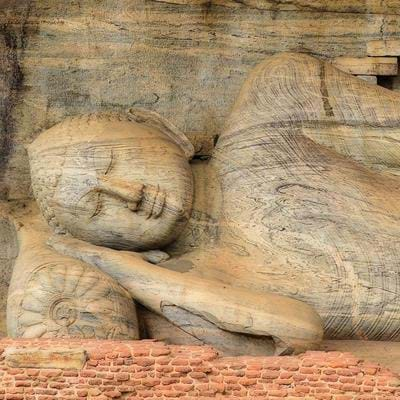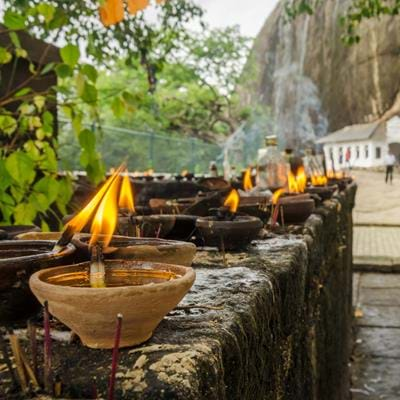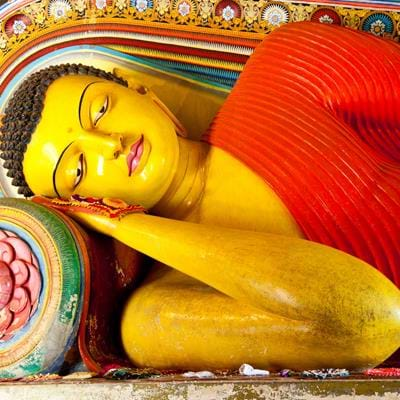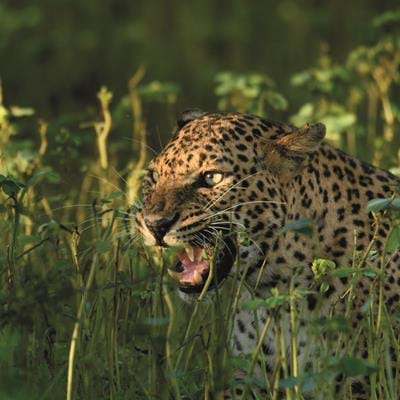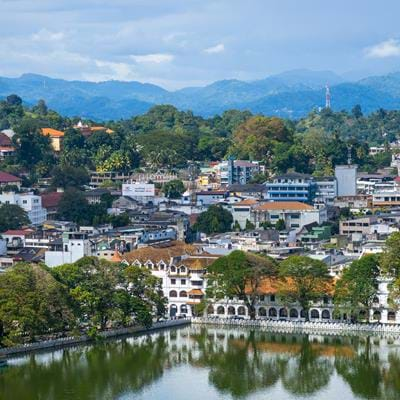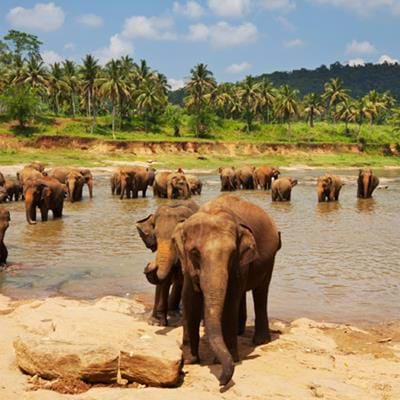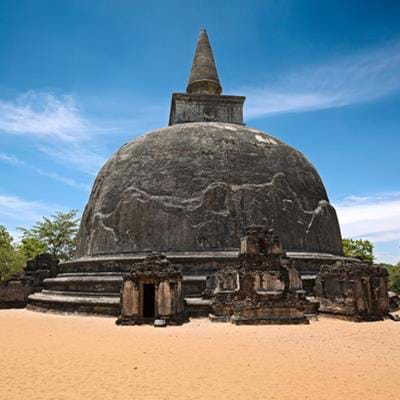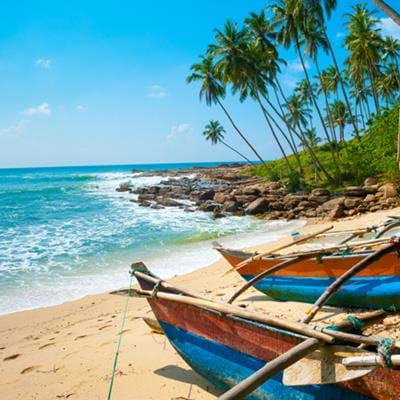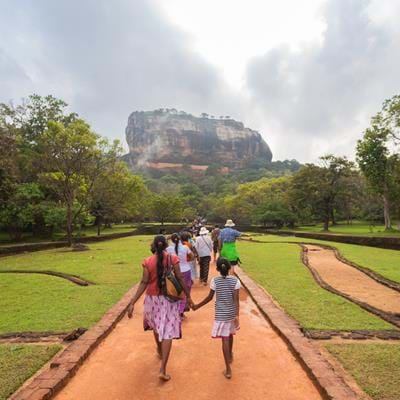Sri Lanka 23.04.2020 John Gimlette
We are delighted to introduce John Gimlette an award winning travel writer and journalist contributing to publishers like The Daily Telegraph, The Guardian, Conde Nast Traveller and Wanderlust. John has published several books on travel over the years ranging from Paraguay to Newfoundland, Canada all while still a practising barrister at the Crown Chambers, Temple, London, specialising in criminal negligence. He lives in London with his wife, Jayne, and daughter, Lucy and is a much loved member of the Transindus family.

His latest novel ‘Elephant Complex: Travels in Sri Lanka', (published 2015) has become compelling reading for visitors to Sri Lanka. It charts the allure this tiny island has held over outsiders from millennia and how their desire to lay claim to this paradise has shaped its whimsical history. In a brilliant astute, sympathetic and often amusing work of travel writing John offers us a snapshot of the island as he speaks of being beguiled by both the place and its people, the astonishing beauty of an island rimmed by clear blue lagoons and pearly white sands, a landscape bustling with wildlife where elephants roam free and of hills “so green they seem to glow with their own internal light.”
It comes as no surprise that so many still flock to this beautiful land to discover a piece of paradise for themselves. We asked John to share some of his favourite books that inspired him the most as he embarked on research for his novel and the images that remain freshest in his memory.
-------------------------------
What are my favourite books on Sri Lanka? It’s hard to know where to start: over the centuries, the island and its people have been energetically documented. When researching Elephant Complex, I worked through a great stack of literature, and then added to it with my own materials (7 journals, 4,500 photographs and 20 hours of recordings). There were hundreds of books to be considered. In the selection below, I’ve included a few I found particularly useful or enjoyable.
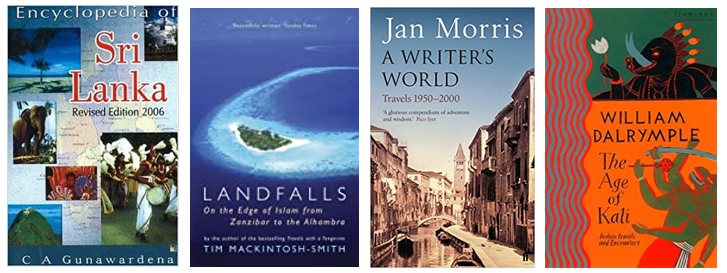
For general reference, there was C.A Gunawardena’s indispensable Encyclopaedia of Sri Lanka (New Dawn, 2006, Delhi). Although a little out of date now, it’s still the place to look up anything Sri Lankan, from Adam’s Peak to Zahira College. It’s the only encyclopaedia I’ve ever read from cover to cover.
There are plenty of outsiders who’ve tried to portray this island. My favourite modern work is that of Tim Mackintosh-Smith, who came in pursuit of Ibn Battutah and whose own adventures are brilliantly described in Landfalls: On the Edge of Islam from Zanzibar to Alhambra (John Murray, 2010, London). However, there is also Jan Morris’ memorable essay, ‘Ceylon’, included within A Writer’s World (Faber, 2003, London). Other visitors who’ve left enjoyable jottings include Paul Bowles, Hermann Hesse, DH Lawrence, Pablo Naruda, and William Dalrymple. The latter made a flying visit during a lull in the civil war, and his impressions appear in The Age of Kali (Flamingo, 1999, London).
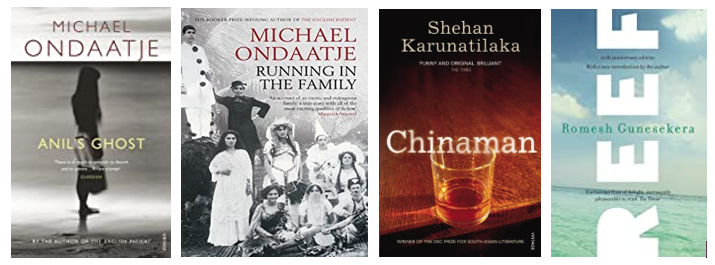
Strangely, for a country where English is a minority language, there’s a strong tradition of Anglophone novels. Michael Ondaatje leads the way, with Anil’s Ghost (Bloomsbury, 2000, London), an exquisite and sinister tale, set during a JVP revolt. In beautiful, sparse prose he describes an era – the 1970s – drenched in beauty and tinged with violence. Equally brilliant is the story he wrote about his chaotic, drunken father, Running in the Family (WW Norton, 1982, New York). The lives of the planters, I discovered, could be full of surprises, and in this end-of-empire tale, there are endless parties, plenty of random affairs, and a stolen train.
Ondaatje, however, is no longer resident in Sri Lanka, and, amongst local authors, two books have stood out in recent years. Shehan Karunatilaka’s Chinaman (Vintage, 2012, London) is deftly crafted, and some of the phrases I could read over and over again. Witty and waspish, it offers a lugubrious take on Colombo life, although, in truth, you have to like cricket to really get it.
More inclusive is Romesh Gunesekara’s Reef (Granta, 1994, London), a curious tale of love and cooking. The narrator, a kitchen boy, is intrigued by his master’s love life, only to find that things are not as they should be. There’s always something delicious on the page, and something indefinable, smouldering away in the subtext.
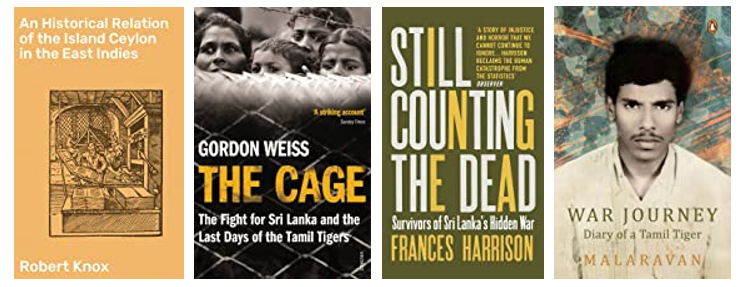
When it comes to colonial history, several contemporary accounts stand out. Amongst the Dutch writers there is Baldaeus and Valentijn, and there are some remarkable English contributions from Robert Percival in 1803 and John Davy, brother of Sir Humphrey. But best of all is Robert Knox’s memoir, An Historical Relation of Ceylon (Royal Society, 1681, London). Marooned on the island in 1679, this merchant of Wimbledon would spend almost twenty years in Ceylon as a prisoner of the Kandyan king. His description of his captivity still informs our understanding of the mountain kingdom.
Needless to say, the Sri Lankan Civil War (1983 to 2009) has generated reams of writing. Much of it is merely opinion, and there’s bias everywhere and plenty of propaganda. That said, there have been some admirable attempts to analyse the causes, and to chart the uneven course of events. The real difficulty lies in ascertaining what happened at the very end. Although some books have sold well, including Gordon Weiss’ The Cage (Bodley Head, 2011, London) and Frances Harrison’s Still counting the Bodies (Portobello, 2012, London), the full facts have yet to be determined. Of all the non-fiction, it is perhaps the memoirs that stand out. Even the LTTE’s veterans have produced the odd bestseller, like War Journey: Diary of a Tamil Tiger (Penguin, 2013, Delhi). But the memoir that really caught my eye was In the Line of Duty (Unigraphics, 2008, Colombo), written by an army surgeon, Gamini Goonetilleke. Trained in Balham, he cut his teeth in Polunnaruwa, patching up farmers injured by elephants. His wartime recollections so intrigued me that I tracked down the author, and we’ve been friends ever since.
Recently, the war has begun to feature in native fiction. The biggest hit of the last few years was Nihal De Silva’s The Road from Elephant Pass (Vijitha Yapa, 2003, Colombo). In it, an army officer and a LTTE girl are thrown together, as they flee for safety. Fast-paced and curiously informative, it’s a gripping read. Much of it is set in the wilds of Wilpattu, a beautiful national park only a few hours north of Colombo (and great for spotting leopards). But, back in the 1990s, these were the badlands, inhabited only by poachers and deserters, and it was here – ironically – that the author was killed by a landmine.
During my travels, I met Ayathurai Santhan, author of The Whirlwind (Pathippagam, 2010, Chennai (Not available on Amazon)). In this novel, which is based on true events, the characters never look for blame, only escape. The story is set in 1987, a bad time for Jaffna City. For six months, it’s been under Tiger control, and then, that July, the Indian Peacekeeping Force arrives. Its soldiers, the jawans, are big, faceless men, readily brutalised by the warring city. In their search for ‘terrorists’, they pound it with artillery, and raid the hospital. Finding no-one, they kill the patients and the doctors, seventy in all. The novel’s characters, however, regard these outrages not with fury but disbelief, as if their world has developed some inexplicable fault. Mr Santhan once told me that this was how he remembered it, and I realised that he’d created not a cast of characters but a city of Santhans.
Amazon Affiliation
You can find out more about and read extracts from the books listed here by clicking on the links, which will take you to their page on the Amazon website. We’ve set up an Affiliation scheme with Amazon, all proceeds from which will be donated to GiveIndia’s campaign to support day-wage labourers in India adversely affected by the Coronavirus outbreak. For more on this initiative, go to:
https://indiafightscorona.giveindia.org/support-families/
